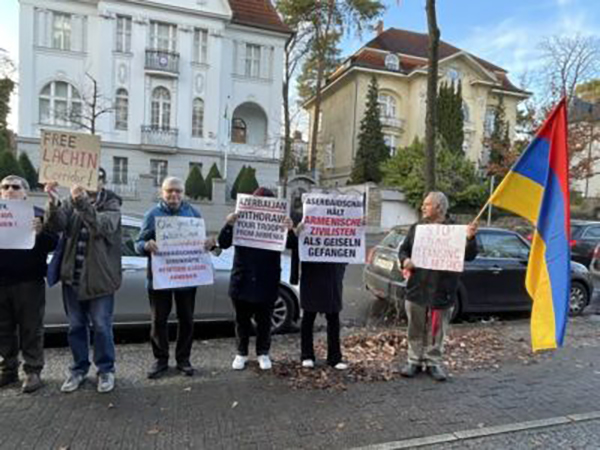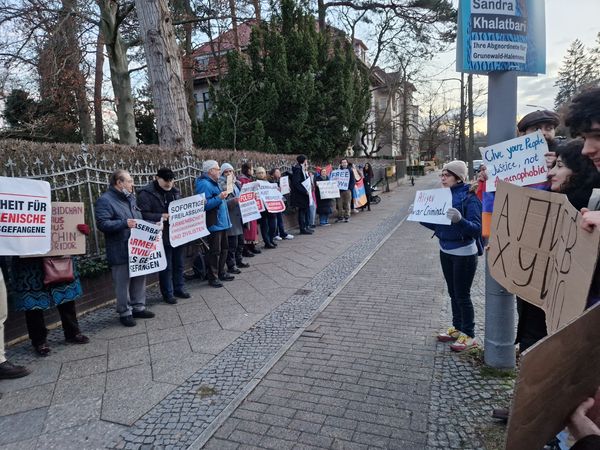
Protests outside the Azerbaijan Embassy in Berlin
on January 13 organized by the Theophanu Club
Germans, Armenians Put the Nagorno-Karabakh Blockade on the Political Agenda
by Muriel Mirak-Weissbach
Armenian Mirror Spectator
BERLIN, JANUARY 19, 2023 — For weeks, political forces in Germany have turned a blind eye to the ongoing Artsakh crisis, while mainstream press organs have observed a complicit silence. Now, as the humanitarian crisis created by Azerbaijan’s blockade of the Lachin corridor worsens, public opinion in Germany and Europe is slowly waking up. This is largely the result of protest actions organized by human rights organizations. As reported last week, Tessa Hofmann, chairwoman of the board of the Berlin-based human rights organization, Against Genocide, for International Understanding (AGA), issued a call to German Foreign Minister Annalena Baerbock, demanding action to establish a humanitarian airlift for the blockaded population of Artsakh. On December 15, she followed up with similar letters to German President Frank-Walter Steinmeier and Chancellor Olaf Scholz, as well as to Dr. Kamal Sido, Near East representative of the Society for Endangered Peoples.
On January 13, activists from the Theophanu Club, a German-Armenian grassroots movement, held a robust demonstration at the embassy of Azerbaijan in Berlin — the third such demo. On December 17, they had gathered in front of the embassies of the Organization for Security and Cooperation in Europe (OSCE) Minsk Group co-chair countries (Russia, the US and France), and on December 29, protested in front of Azerbaijan’s diplomatic site. In their leaflets and pickets they called for an airlift and an end to the life-threatening blockade. Protestors held up pickets like: “Aliyev war criminal,” “Hands off Armenia,” “Free Armenian POWs,” as well as “Azerbaijan committing genocide in Artsakh” and “Give your people justice, not Armenophobia!”
Lilit Kocharyan, who issued the call for the demonstrations, is also chairwomen of the board of Kamurdsch-Brücke (Bridge), a charity organization in Germany which organizes medical aid for patients and institutions in Armenia.

Protests outside the Azerbaijan Embassy in Berlin on January 13 organized by the Theophanu Club
The following day, January 14, the national weekly Der Spiegel held a podcast, entitled, “What the Nagorno-Karabakh blockade has to do with Russia’s war.” Podcast host Olaf Heuser spoke with journalist Anna Aridzanjan, from Yerevan, as well as Gayane Beglarian, one of the fortunate few who had been allowed to reach Armenia, to access cancer treatment for her daughter. In the course of the discussion, viewers learned the basic facts of the matter: that 100,000-120,000 Armenians, of whom 30,000 children, are cut off from food and medical supplies, drugstores are selling pills one by one, baby food is scarce, electricity is cut off — all due to the illegal blockade.
Then the focus shifted to the role of Russia, and the manner in which Azerbaijani President Ilham Aliyev is exploiting the Ukrainian conflict to seize control of Artsakh. That ambition is not new, the moderator explained. Aliyev, and his father before him, have made no secret of the intention to force Armenians to become Azerbaijani citizens if they wanted to remain. And, despite its historical role as protective power, Russia is passive. Russian peacekeepers who have been there for five weeks, say they are unable to intervene on Azerbaijan territory. Is Putin too involved in the Ukraine war to deal with Armenia? Or is he exploiting the situation? Moderator Heuser recalled the meeting between President Putin and Aliyev just two days before Russia invaded Ukraine, during which they were filmed discussing cooperation and sharing jokes. The podcast referenced Armenia’s dilemma regarding its membership in the Collective Security Treaty Organization (CSTO); if it leaves the military alliance due to lack of support, will that create a security vacuum that would invite Azerbaijan’s aggression?
Press coverage and discussion of the crisis is necessary and useful, but to lift the blockade and solve the underlying conflict requires political action. Thus, the importance of applying pressure on political leaders and legislative bodies. On January 18, the Heinrich Böll Foundation, a thinktank related to the Green Party, will hold an online discussion on the “Humanitarian Crisis in Nagorno-Karabakh and the Armenian-Azerbaijani Conflict.” A day later, the European Parliament is scheduled to discuss a resolution on the “Humanitarian Consequences of the Blockade in Nagorno-Karabakh.” And the civil society protest actions will likely escalate.